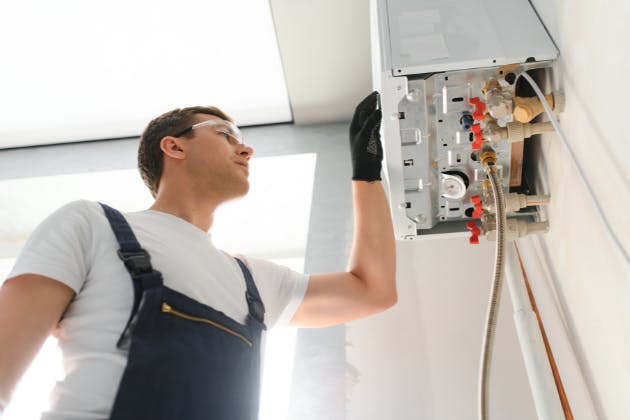Installing a new boiler is a significant investment for your home, ensuring efficient heating and comfort. Asking the
right questions when choosing a boiler installer can make a crucial difference in the quality of installation and
long-term performance. In this article, we have highlighted some of the top questions you should ask your boiler
installer before installing a new boiler in your home.
Want to hire reliable boiler installers in
Newcastle, Morpeth, Bedlington, Ashington or the surrounding areas? Give us a call today at 01383799057.

Pre-Installation Questions
When selecting a boiler installer, their experience is paramount. Ask about their years in the trade,
the number of installations they've completed, and their familiarity with various boiler types and
brands. Request references from recent clients and examples of similar installations. An experienced
installer will confidently provide this information, demonstrating their expertise and reliability.
Certification and insurance are non-negotiable. In the UK, ensure your installer is Gas Safe registered
for gas boilers. This certification confirms they're legally qualified to work on gas appliances. For
oil boilers, OFTEC registration is essential. Ask to see their ID card and verify their credentials on
the official registers. Insurance is equally crucial. Public liability insurance protects you if
something goes wrong during installation. Professional indemnity insurance covers any issues arising
from incorrect advice. Request proof of both before proceeding.
The ideal boiler depends on your specific circumstances. Combi boilers provide hot water on demand and
are suitable for smaller homes with limited space. System boilers work well for properties with multiple
bathrooms and high hot water demand. Regular boilers are often best for older homes with traditional
heating systems. Consider factors like your property size, number of bathrooms, water pressure, and
energy efficiency requirements. A knowledgeable installer will assess these aspects and recommend the
most suitable option, explaining their rationale clearly.
Installation Specifics
Boiler location is critical for efficiency, safety, and convenience. Discuss potential locations,
considering factors like proximity to gas and water supplies, flue accessibility, and noise levels.
Ensure there's adequate space around the boiler for servicing and repairs. The installer should explain
clearance requirements and any building regulations that might affect placement.
Flue installation is a crucial safety aspect. Discuss whether a vertical or horizontal flue is more
appropriate for your property. The installer should explain clearance requirements from windows, doors,
and boundaries. If the flue terminates near a walkway or neighbouring property, a plume kit may be
necessary to redirect exhaust gases.
Existing pipework may need upgrading to support a new boiler. Gas pipes should typically be mm for most
modern boilers to ensure adequate gas flow. The installer should assess your current pipework and
explain any necessary upgrades. Water supply is equally important. Discuss whether your mains pressure
is sufficient for a combi boiler or if a system boiler with a feed and expansion tank is more suitable.
The installer should also evaluate your drainage system to ensure it can handle condensate from
high-efficiency boilers.
Safety and Compliance
Modern boilers come with built-in safety features, but additional measures may be necessary. Low water
cut-off devices prevent the boiler from operating without sufficient water, reducing the risk of
overheating. Carbon monoxide detectors are essential near the boiler and in sleeping areas. Discuss
combustion air supply, particularly for sealed system boilers. Adequate ventilation is crucial for safe
operation. The installer should explain how they'll ensure proper air supply and venting.
Boiler electrical requirements are often overlooked but are vital for safety and performance. Discuss
the need for a dedicated circuit with the correct amperage. Ensure proper grounding to prevent
electrical hazards. In areas prone to moisture, such as basements, GFCI protection may be necessary. The
installer should explain how they'll ensure compliance with electrical regulations and whether any
upgrades to your electrical system are needed.
Post-Installation Checks
Thorough post-installation checks are crucial for safety and efficiency. The installer should flush the
hydronic system to remove debris and air, clean strainers, and test all controls. Gas pressure and flow
rates should be verified to ensure optimal performance. Ask about leak tests for both gas and water
connections. The installer should perform a flue gas analysis to confirm proper combustion and
efficiency. Request a detailed explanation of their commissioning process.
Proper documentation is essential for warranty purposes and future reference. The installer should
provide a Gas Safe certificate for gas boilers or an OFTEC certificate for oil boilers. This
documentation confirms the installation complies with current regulations. Ensure you receive the
manufacturer's warranty registration, completed and submitted on your behalf. Request a startup report
detailing all commissioning checks and results. These documents are crucial for future servicing and
potential insurance claims.
Hire an Expert Gas Engineer in Newcastle, Morpeth, Bedlington or Ashington
Choosing the right boiler installer is crucial for the efficiency and longevity of your heating system. By asking
these key questions, you can make informed decisions that ensure a successful boiler installation.
Looking for a professional boiler installer in Newcastle, Morpeth, Bedlington, Ashington or the surrounding areas?
Reach out to our team of professionals at 01383799057 or fill out this contact form.



